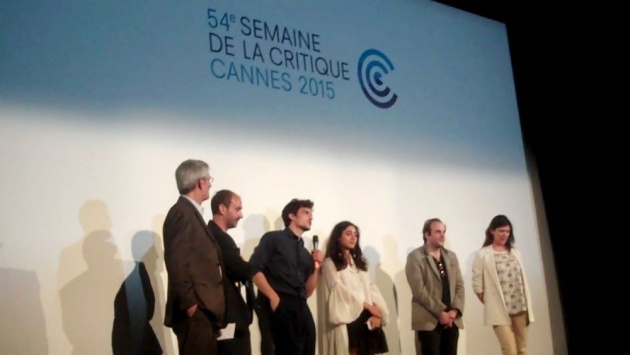
I have no problem with films about unlikeable protagonists - otherwise I wouldn’t have seen Downfall, Henry: Portrait of a Serial Killer and Howard the Duck. It is when filmmakers idolise them that I start to get worried. At one point in Les Deux Amis, the directorial debut of actor Louis Garrel, the two friends of the title drag a young woman against her will screaming off the train that will take her back to prison after a controlled period of day release. Their action will almost certainly increase her sentence. Yet this action is not treated as a crime for which the two young men are punished. They are the heroes; we should like them. Yay!
Les Deux Amis begins in voyeuristic fashion with Garrel’s camera panning down a row of cubicles in which young women are taking showers. It stops on Mona (Golshifteh Farahani), who is obviously of Middle Eastern descent. This makes the scene doubly troubling. Normally women like Mona are covered up; it is demeaning for them and their family to be displayed in a way that could be considered alluring. The scene has a point. For afterwards, Mona is returned to her cell. The shower is a form of release for her, even more than the café at the Gare du Nord where she is allowed to work.
Mona has attracted the attention of Clément (Vincent Macaigne), a bearded boorish man who doesn’t appear to have regular employment. He appears to be a minor actor or featured extra – there are a couple of scenes of him involved in filmmaking, one in which he maintains character without regard to direction, stopping the lead character as he doesn’t present a ticket. Clément is besotted with Mona, through has made the mistake of presenting her with a bird in a cage as a present – he has no idea that she is similarly incarcerated. She has no desire to continue the relationship, but Clément thinks it is because of her parents.
Clément’s best friend is Abel (Garrel) who appears to be a writer. He is also something of a ladies’ man, though when he ends up in a police cell for attempting to set off Clément’s car alarm, at least one of his ladies doesn’t want to hear from him. He gets Mona’s attention while she is at work, checking her out as it were, and he and Clément follow her to her train. It is there they decide to take direct action, affecting the course of her journey home and her immediate future.
Their action is purportedly liberating. But their sole aim is to force the issue of Mona’s feelings for Clément. Instead, the film takes a different, though in many ways (if you have seen Jules et Jim) predictable direction.
Les Deux Amis is not without its moments, notably when Mona does a mad dance in an empty bar, like a marionette freed of her strings discovering the use of her limbs. But the film does endorse that familiar misogynistic assertion that all a woman needs is a good – ahem.
Out of this thin drama some comedy does emerge, notably a declaration of feelings in a Catholic church that shocks a worshipper. My fault, my fault, my grievous swear word, indeed. At one point, Abel tests his own heterosexuality by allowing his leg to be rubbed by a homosexual hotel concierge. ‘This isn’t doing anything for me,’ he explains. We know how he feels.
There is a long, not necessarily honourable tradition of French films where a smart man is paired with an imbecile. Les Deux Amis plays to this model. As in the archetype, the ‘imbecile’ proves his worth and sensitivity, though you sense Garrel is still playing it for laughs.
The title is withheld until the final scene in order to comment on what we have watched; unlike the Americans, the French ‘do’ irony. However, your sympathies lie with Mona rather than the boors Clément and Abel. There is a ‘film within a film’ in which Clément, Abel and Mona take part in a recreation of the Paris street riots of May 1968. The featured extras are divorced from the revolutionary spirit of the age, more concerned with the catering.
Garrel co-wrote the film with film director Christophe Honore. The result is slight and misanthropic. I suspect Garrel’s jaundiced view of friendship might have something to do with his upbringing, friends wanting to get to know him because his father is the famous French director Philippe Garrel. One wishes his debut film was more dispassionate and less cruel. It is impossible to recommend on any level.
Reviewed at Salle Miramar, Cannes, Monday 18 May, 15:00 screening, introduced by the director



